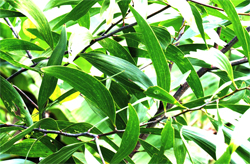 |
|
| Synonym: |
Racosperma auriculiforme (Benth.) Pedley. |
| Sub Family |
Mimosoideae |
| Local Names: |
Acacia, Darwin black wattle, Ear pod wattle |
| |
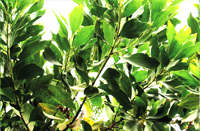 |
|
| Synonym: |
Racosperma mangium (Willd.) Pedley. |
| Sub Family |
Mimosoideae |
| Local Names: |
Manjium, Hickory wattle, Black wattle |
| |
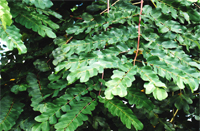 |
|
| Synonym: |
Adenanthera gersenii Scheff. |
| Sub Family |
Mimosoideae |
| Local Names: |
Manjadi, Circassian tree, Red bead tree |
| |
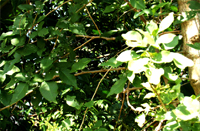 |
|
| Synonym: |
Crateva marmelos L. |
| Sub Family |
Rutaceae |
| Local Names: |
Koovalam, Vilvam, Bael tree, Holy fruit tree |
| |
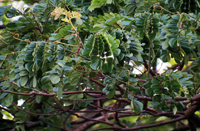 |
|
| Synonym: |
Mimosa saman Jacq. |
| Sub Family |
Mimosoideae |
| Local Names: |
Mazhamaram, Urakamthungi maram, Rain tree |
| |
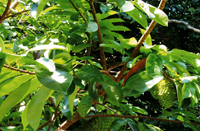 |
|
| Synonym: |
Annona macrocarpaWercklé |
| Sub Family |
Annonaceae |
| Local Names: |
Cancer chakka, Mullathi, Soursop |
| |
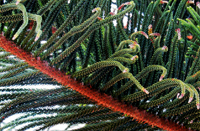 |
|
| Synonym: |
Entassa heterophylla Salisb. |
| Sub Family |
Araucariaceae |
| Local Names: |
Norfolk Island pine, House pine, Australian pine |
| |
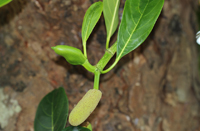 |
|
| Synonym: |
Artocarpus integrifolius Wight. |
| Sub Family |
Moraceae |
| Local Names: |
Plavu, Jack fruit tree |
| |
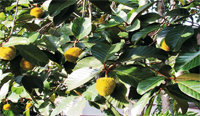 |
|
| Synonym: |
Artocarpus pubescens Willd. |
| Sub Family |
Moraceae |
| Local Names: |
Ayani, Anjili,Wild jack |
| |
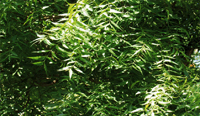 |
|
| Synonym: |
Melia azadirachta L. |
| Sub Family |
Meliaceae |
| Local Names: |
Aryaveepu, Neem, Indian lilac, Margosa Tree |
| |
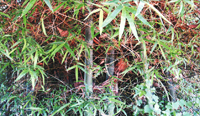 |
|
| Synonym: |
Bambusa arundinacea (Retz.) Willd. |
| Sub Family |
Poaceae |
| Local Names: |
Mula, Muncha, Bamboo, Spiny bamboo |
| |
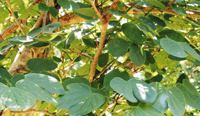 |
|
| Synonym: |
Phanera variegata L. |
| Sub Family |
Caesalpinioideae |
| Local Names: |
Chuvanna Mantharam, Mountain ebony |
| |
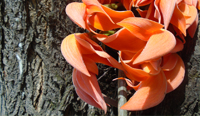 |
|
| Synonym: |
Erythrina monosperma Lam. |
| Sub Family |
Papilionoideae |
| Local Names: |
Brahmavriksham, Chamatha, Flame of the forest |
| |
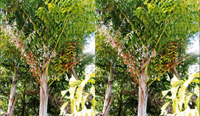 |
|
| Synonym: |
No synonyms are recorded for this name |
| Sub Family |
Arecaceae |
| Local Names: |
Chundapanna, Olatti, Elephant's palm, Jaggery Palm |
| |
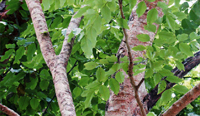 |
|
| Synonym: |
Bactyrilobium fistula Wild. |
| Sub Family |
Caesalpinioideae |
| Local Names: |
Kannikonna, Golden shower, Indian laburnum |
| |
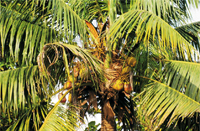 |
|
| Synonym: |
Calappa nucifera (L.) Kuntze. |
| Sub Family |
Arecaceae |
| Local Names: |
Thengu, Shubaga, Coconut tree |
| |
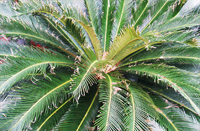 |
|
| Synonym: |
Cycas miquelii Warb. |
| Sub Family |
Cycadaceae |
| Local Names: |
Chanappana, Eenth, Eenthinpana, The sago cycad |
| |
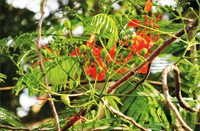 |
|
| Synonym: |
Poinciana regia Hook. |
| Sub Family |
Caesalpinioideae |
| Local Names: |
Poomaram, Gulmohar, Royal poinciana, Flame tree |
| |
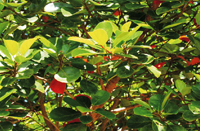 |
|
| Synonym: |
Elaeocarpus oblongus Gaertn. |
| Sub Family |
Elaeocarpaceae |
| Local Names: |
Bhadraksham, Kara, Wild olive tree, Ceylon olive |
| |
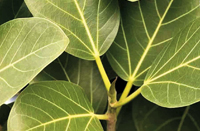 |
|
| Synonym: |
Urostigma bengalense (L.) Gasp. |
| Sub Family |
Moraceae |
| Local Names: |
Peraal, Benyan tree |
| |
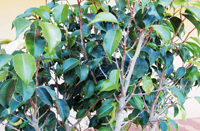 |
|
| Synonym: |
Ficus parvifolia Oken. |
| Sub Family |
Moraceae |
| Local Names: |
Vellaaal, Golden fig, Benjamin tree, Java fig |
| |
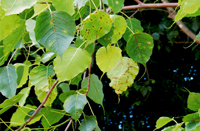 |
|
| Synonym: |
Ficus peepul Griff. |
| Sub Family |
Moraceae |
| Local Names: |
Arayaal, Peepal tree, Sacred fig, Bodhivriksham |
| |
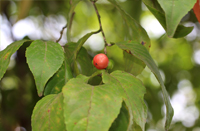 |
|
| Synonym: |
Stigmarota jangomas Lour. |
| Sub Family |
Flacourtiaceae |
| Local Names: |
Loika, Lavalolikka, Luikka, Puneala plum |
| |
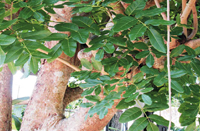 |
|
| Synonym: |
Bignonia africana Lam., Kigelia pinnata (Jacq.) DC., Crescentia pinnata Jacq. |
| Family |
Bignoniaceae |
| Local Names: |
Sivakundalam |
| |
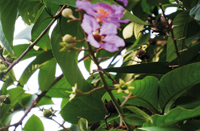 |
|
| Synonym: |
Munchausia speciosa L. |
| Family |
Lythraceae |
| Local Names: |
Poomaruthu, Pride of India, Queen of flowers |
| |
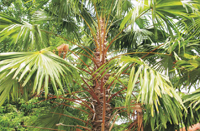 |
|
| Synonym: |
Pritchardia grandis (Wendl.) W.Bull. |
| Family |
Arecaceae |
| Local Names: |
Ruffled Fan palm |
| |
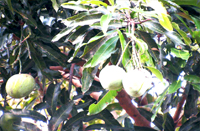 |
|
| Synonym: |
Mangifera austroyunnanensis Hu. |
| Family |
Anacardiaceae |
| Local Names: |
Maavu, Mango tree, Cuckoo's joy |
| |
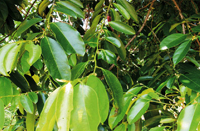 |
|
| Synonym: |
Mimusops javensis Burck. |
| Family |
Sapotaceae |
| Local Names: |
Elenji, Spanish cherry, Bullet wood, West India medlar |
| |
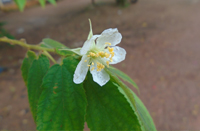 |
|
| Synonym: |
Muntingia rosea H.Karst. |
| Family |
Elaeocarpaceae |
| Local Names: |
Pancharappazham, Bird's cherry, Cotton candy berry |
| |
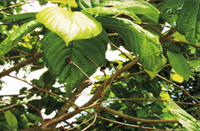 |
|
| Synonym: |
Anthocephalus cadamba (Roxb.) Miq. |
| Family |
Rubiaceae |
| Local Names: |
Aattuthekku, Kadambu, Cadam, Kadam |
| |
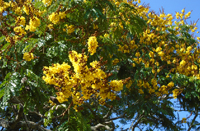 |
|
| Synonym: |
Inga pterocarpa DC. |
| Family |
Caesalpinioideae |
| Local Names: |
Charakonna, Yellow flame tree, Copper pod tree |
| |
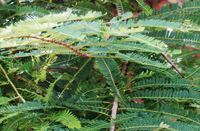 |
|
| Synonym: |
Emblica officinalis Gaertn. |
| Family |
Euphorbiaceae |
| Local Names: |
Nelli, Amla, Indian Gooseberry |
| |
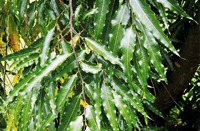 |
|
| Synonym: |
Uvaria longifolia Sonner. |
| Family |
Annonaceae |
| Local Names: |
Arannamaram, Telegraph pole tree, Cemetery tree |
| |
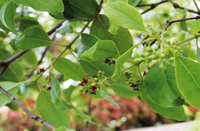 |
|
| Synonym: |
Sirium myrtifolium L. |
| Family |
Santalaceae |
| Local Names: |
Chandanam, Sandal tree, White sandal tree |
| |
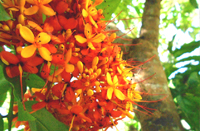 |
|
| Synonym: |
Jonesia asoca Roxb. |
| Family |
Caesalpinioideae |
| Local Names: |
Ashokam, Asoka tree |
| |
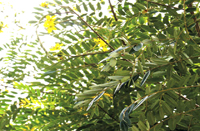 |
|
| Synonym: |
Cassia siamea Lam., Cassia florida Vahl. |
| Family |
Leguminosae Sub family Caesalpinioideae) |
| Local Names: |
Manjakonna, Ironwood tree, Siamese senna |
| |
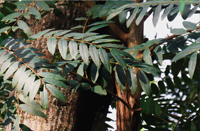 |
|
| Synonym: |
Quassia simaruba L.f. |
| Family |
Simaroubaceae |
| Local Names: |
Lakshmitharu, Paradise tree |
| |
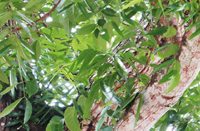 |
|
| Synonym: |
Cedrela mahagoni L. |
| Family |
Meliaceae |
| Local Names: |
Mahogany, West Indian mahogany |
| |
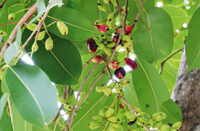 |
|
| Synonym: |
Myrtus cumini L. |
| Family |
Myrtaceae |
| Local Names: |
Njaval, Black plum, Jambol, Java plum |
| |
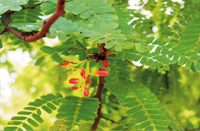 |
|
| Synonym: |
Tamarindus occidentalis Gaertn. |
| Family |
Caesalpinioideae |
| Local Names: |
Puli, Tamarind tree, Indian date |
| |
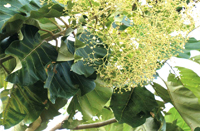 |
|
| Synonym: |
Jatus grandis (L.f.) Kuntze. |
| Family |
Lamiaceae |
| Local Names: |
Thekku, Teak, Indian Oak |
| |
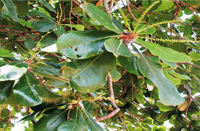 |
|
| Synonym: |
Terminalia badamia DC. |
| Family |
Combretaceae |
| Local Names: |
Badham, Indian almond tree, Java almond |









































